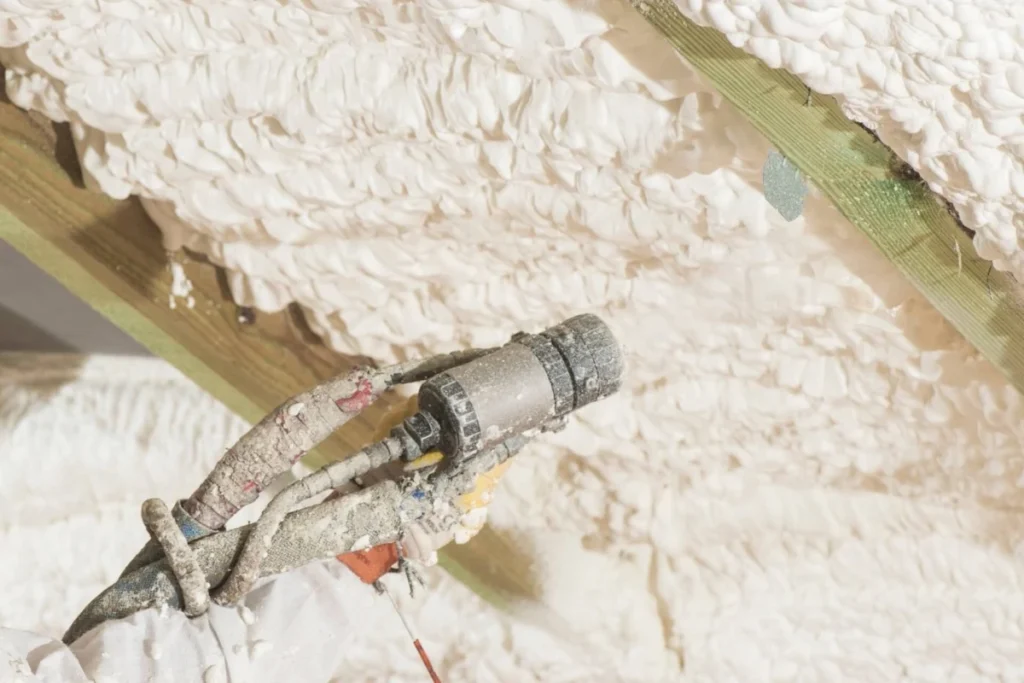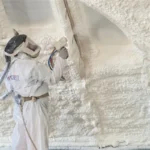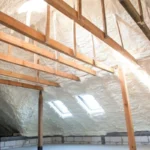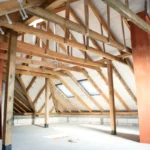Even minimal inadequacies related to the insulation of a building can be responsible for significant heat loss in the future, and any mistakes made during installation will not become apparent immediately, but only several years after the construction has been completed. Their detection and repair are difficult, time-consuming and quite costly processes. Therefore, no one needs to be convinced that choosing the best quality insulation materials and methods is crucial.
Effective insulation
When choosing insulation materials, thermal insulation parameters (e.g. low thermal conductivity λ), low water absorption and properly selected mechanical strength are rightly considered to be the most important. The aforementioned parameters and the correct execution of the insulation are important, but equally important is a professional and reliable approach to the investor. A detailed conversation, the aim of which is to familiarise the investor with the material, with all its features and properties, will result in the investor making a fully informed choice of a satisfactory solution.
The perfect warming? Above all, insulation must be professionally carried out
The builder should be well acquainted with all the advantages, but also the disadvantages, of the insulation he is considering choosing. There is no ‘ideal material’ on the construction market. Polyurethane (polyurethane insulation) also has its advantages and disadvantages, which can be exacerbated by the wrong choice of application surface and poor workmanship. Incorrect workmanship applies to all insulation materials available on the market and is one of the biggest risks the uninformed investor is exposed to. When deciding on insulation, it is therefore worth entrusting its application to a specialist recommended by the manufacturer.

Spray foam polyurethane insulation solution
One of the solutions available on the market for effective building insulation is Crossin Insulations®, which are, among other things, polyurethane spray foam insulation systems.
Polyurethane – good insulation
Compared to other materials, closed-cell polyurethane foam has one of the lowest thermal conductivity coefficients (λmean, i ≤ 0.021 W/(m-K)).
Its strength parameters are also outstanding, which is extremely important for external insulation, e.g. for foundations, flat roofs or ‘underfloor’ surfaces. For example, the compressive strength at 10% relative strain is 400 kPa. This value is several times higher than the accepted value, but it gives the entire building structure additional reinforcement. Importantly, this increased strength does not in any way affect the insulation properties or the cost of the material itself. The reason is that the properties of polyurethane insulation with increased strength, are better despite comparatively smaller (often quite significantly) thicknesses.
Crossin Insulations® foam is also characterised by reduced water absorption (Wp ≤ 11 kg/m2), so that it retains its thermal insulation properties despite the passage of years and changing weather conditions in such a demanding and difficult environment as the ground.
Effective insulation means no thermal bridges
Further advantages of Crossin Insulations® brand polyurethane (PUR) foam also include: excellent adhesion to various building materials (including concrete blocks, hollow bricks and bricks), high performance and a seamless application method.
Innovative and state-of-the-art application technology using professional, high-pressure machines effectively eliminates the appearance of possible thermal bridges and allows a uniform, seamless and energy-efficient coating to be created. In addition, due to its comparatively low weight, spray-foam polyurethane insulation does not weigh down the building structure.
Spray insulation. Polyurethane in many ways
An interesting differentiator when it comes to Crossin Insulations® brand spray insulation is its dedicated approach for specific applications.You can find other systems for insulating external surfaces and others for insulating internal surfaces.
Crossin Insulations® are also systems that have been separately designed for attic insulation, ceiling insulation or wall insulation. In addition to excellent adhesion, they are distinguished by their very rapid foaming, so that the liquid form of the sprayed system does not drip or run off, which could have a negative effect on the final thickness of the insulation and heat loss in the house.
In the case of dedicated systems for external flat roof insulation or floor screed insulation, the distinguishing feature is the slightly slower foaming, which allows the system to spread better over the surface to be insulated. Crossin Insulations® spray insulation also provides consistent performance over time and, thanks to Bio Defence Technology, protection against mould, fungi and other micro-organisms.
Consultation and valuation of insulation
FAQ
What is PUR spray foam?
Spray polyurethane foam (a.k.a. spray, PUR foam) is a proven insulation material, mechanically applied to the insulated surface.
Spray foams are a modern insulation material with some of the best thermal insulation parameters. Crossin pur foam is a low-absorbing material that guarantees the maintenance of excellent thermal, moisture and acoustic insulation properties throughout the life of the house.
The spray application method of foam provides a seamless insulation layer, devoid of the so-called. thermal bridges.
Unlike traditional materials such as mineral wool, foam permanently bonds to the substrate during application and resists slipping and movement of the material over the years.
What are the types of spray foam?
Spray foams can have different structures. There are foams with closed-cell structure (otherwise rigid foam, hard foam) and pur foams with open-cell structure (otherwise semi-rigid foam, soft foam). With the structure of the foam is strongly related to the density. The more closed cells, the higher the density of the material. The structure has a significant impact on the application of the foam.
Open-cell pur foams are used in single-family housing, for insulating attics, ceilings, walls. They are excellent as insulation in frame houses.
Closed-cell foams are used for insulating warehouses, industrial buildings, agricultural buildings, halls and flat roofs.
In single-family housing, closed-cell foams are used as foundation insulation and floor insulation.
CONTENTS OF CLOSED CELLS
(according to EN 14315-1)
Class CCC1: < 20%
Class CCC2: Od 10% do 80%
Class CCC3: > 80% do 89%
Class CCC4: ≥ 90%
What is the typical use of spray insulation?
Spray insulation can be used both indoors and outdoors to insulate roofs, walls, floors and foundations.
In single-family housing, spray foam is an excellent material for insulating attics, walls, and ceilings.
Closed-cell foams are used to insulate foundations, floors, flat roofs, warehouses, industrial buildings and farms.
What are thermal bridges and how can they be located at home?
Thermal bridges (or thermal bridges) are places in the insulation layer where there is increased heat loss due to reduced thermal insulation properties due to, for example, joints. Thermal bridges arise, for example, as a result of the use of improper technology, incorrect installation or poor adhesion of one material to another (e.g., between the rafter and traditional insulation material, or as a result of flopping on the structural cords or slipping). The easiest way to observe the effects of thermal bridging is to unseal the window slightly in winter. Then you can feel with how much force the cold air enters the room. Thermal bridges can also be seen in the case of frozen rafters, which often give black vertical stripes on ceilings covered with plasterboard.
PUR foam insulation avoids thermal bridges. Spray foam allows it to be applied tightly even with complex roof structures. Permanently bonding with the substrate, it does not change its position over time, ensuring the tightness of the insulation throughout the life of the house.
Can spray insulation be used in old (historic) buildings?
The PUR foam spray method is widely used in renovation and insulation work, as well as in repair work. Due to the fact that it is an extremely airtight and durable solution that does not require the dismantling of the previous covering/material. In addition, the PU foam spray method is very popular for insulating brand-new buildings and spaces that rely on lightweight and durable solutions.
Does PUR spray foam absorb moisture?
The issue depends on the structure of the foam.
Open-cell foam absorbs moisture from the air, but also gives it back. It therefore performs well in rooms where moisture is relatively low, mainly pur foams are used as insulation in single-family housing.
In the case of Crossin Attic Soft foam, the short-term water absorption coefficient is one of the best on the market and is:
Wp ≤ 0,85 kg/m2
In the case of closed-cell foam, it absorbs very little moisture.
For example, the short-term soak factor for Crossin Wall foam is:
Wp ≤ 0,11 kg/m2
Is spray insulation (polyurethane) safe for humans?
Spray insulation has been used for many years in residential construction, which is protected by increasingly stringent building codes. Therefore, the PU spray foam systems we offer have been thoroughly tested and inspected beforehand. In addition, they have all the necessary tests, approvals and certificates. Also, our laboratory constantly controls the quality and safety of the raw materials used and finished products. Spray insulations are even advisable for use in rooms where allergy sufferers will reside.
Crossin foam is tested for the development of mold o fungi. The test confirmed the absence of mold and fungus development on Crossin pur foam.
Polyurethane foams surround us in everyday life. Polyurethane foams are the filling of mattresses, most furniture seats, seats and dashboards in cars, the filling of refrigerators.
The above examples can be multiplied, confirming the health safety of using polyurethane foams.
When to do spray insulation? (Before or after plastering)
If insulation and plastering are done during the summer, when the house is heavily ventilated, insulation can be done before plastering.
In addition, in the case of diffusion-open roofs (membrane), the foam has the ability to drain any moisture it may absorb during wet work.
In general, Crossin Attic Soft foam has a low short-term absorption rate and quickly gives back absorbed moisture while retaining its properties.
Regardless of the order of the work, you need to remember to ventilate intensively after plastering to get rid of moisture at a rapid pace.
Should a vapor barrier always be used?
Not always.
According to the art of construction, vapor barrier film should be installed in all rooms.
However, it should be borne in mind that there is no moisture in most rooms, and Crossin Attic Soft foam, for example, has a very low soak factor.
Taking into account the above factors, you can dispense with the vapor barrier film, but be sure to use it in rooms that are particularly exposed to moisture, including bathrooms, kitchens, laundry rooms and drying rooms.
Can PUR spray insulation be used only for attics and roofs?
Not only that. PU foam spray insulation can also be used for insulation of ceilings, walls and foundations. PU spray foam is widely used for interior and exterior insulation.
Can PUR spray foam be applied with a membrane?
Yes. PUR spray foam insulation adheres perfectly to most commercially available roofing membranes.
Membrane spraying is one of the most popular forms of polyurethane foam attic insulation.
What are the characteristics of open-cell foam spraying?
Comparing open-cell foam with closed-cell foam, it should be mentioned that such spraying of the former has a much lower density, and thus is lighter for the building structure.
Open-cell foam is well permeable to water vapor. Hence, after the use of this type of foam purbudynek "breathes", and at the same time such insulation has very good sound-absorbing (acoustic) properties.
Crossin foams are low thermal conductivity coefficient λ = 0.037,W/m2. As of 2021, energy efficiency requirements for buildings, for roofs and soffits impose a heat transfer coefficient value of U = 0.15 W/(m2K). By using Crossin Attic Soft foam with a small insulation thickness of 25 cm, a value of U = 0.148 W/(m2K) can be achieved.
An important feature of pur insulation is tightness. The way the foam is applied guarantees seamless insulation. Even with complex structures, this allows to eliminate 100% the appearance of possible thermal bridges.
Sprayed polyurethane foam permanently bonds to the substrate and resists sliding and displacement over the years.
The foam also does not lose its insulating properties over time.
What substrates can PUR open-cell foam spraying be applied to?
Nowadays it is most common to spray on a vapor-permeable membrane or boarding. This mainly applies to attic insulation. The minimum temperature of the substrate in this case is 10ºC. Other materials used in construction, which perform well due to good adhesion with open-cell foam spraying, are: gypsum board (sprayed on partition walls) and concrete (sprayed on ceilings).
IMPORTANT: It is not permissible to apply directly to the tile.
What is insulation?
Insulation is a material whose purpose is to protect two adjacent systems or surfaces from mutual adverse interactions. The following types of insulation are distinguished:
- Electrical (preventing the flow of electrical charges)
- Waterproofing (protecting against water, moisture and steam)
- Thermal insulation (which protects against unfavorable heat exchange with the environment)
- Windproofing (to protect against heat loss)
- Acoustic (lowering the intensity of sounds and suppressing unwanted sounds)
- Anti-vibration (reduce the impact of vibrations on building elements, machinery)
- Chemically resistant (protect the element from environmental aggression)
Features of effective insulation
- Stability of parameters
- Leakage
- No thermal bridges
responsible for heat loss - Low thermal conductivity
- Optimum thickness
- Lightweight (no strain on the structure)
- Good adhesion to various materials
- Resistance to changing weather conditions, especially temperature and humidity
- Mechanical, chemical and biological resistance
Does PUR foam insulation risk rotting the trusses?
If dry wood is used for construction, there are no risks. An authorized Crossin contractor inspects the wood before spraying and will not undertake the work if the moisture content is too high. Foam, due to its high adhesion, adheres to the surface of the wood and provides a barrier against environmental influences. It is with foam, due to its properties, that in houses, for example, wooden roof windows are protected. Any access of moisture is possible from the outside, and the foam, due to its breathability, allows it to evaporate.
Is PUR foam insulation expensive?
Whether something is expensive or not is a very relative concept. However, comparing it with other types of insulation, it seems that polyurethane foam insulation is not expensive. The average price of insulation, depending on the thickness, is in the range of 45-70 PLN/m2. If you choose another good insulation material (not from a promotion at a home improvement store) and add the workmanship of a good installation team, you will often find that the price of spraying polyurethane foam is comparable or even lower.
Also note that the price quoted by authorized Crossin contractors is final. It includes the price of material and labor, and the contractor is left with a cleaned room and good insulation. Taking into account the cost, the execution time is also not insignificant, which usually closes in one day, giving the opportunity to continue further finishing work.
It is worthwhile to schedule a free consultation and quote with a Crossin Authorized Contractor.
Does PUR foam oxidize and shrink over time?
Another myth circulating in the market. Pinka does not oxidize or shrink over time. The test standards necessary for parameter entries in declarations of performance take into account the effect of aging 25 years. The only thing that harms, and only the top layer of insulation, is UV radiation. Covering the foam with plasterboard completely protects it. The foam does not shrink, degrade or peel from the surface to which it was applied. Uncovering the walls after years, we can expect the insulation in exactly the same condition as on the day of application, which is an advantage over other insulation materials, such as wool, which tend to move and slip over time.
Does the lambda of PUR foam deteriorate over time?
The initial lambda value measured just after spraying is lower than that stated in the property declaration. This is the so-called initial lambda, the magnitude of this parameter at a level from λ=0.033 W/(m.K) is obtained only shortly after application and can in no way be taken into account in the selection of the material. The change in lambda is due to the penetration of atmospheric air into the foam cells; once gas equilibrium is established, the lambda value remains constant.
The declaration of properties states the value of the declared (aging) lambda, which stabilizes after spraying and takes into account the maintenance of properties min. 25 years. In the case of Crossin foam, this value is λ= 0.037 W/(m.K).
Declared lambda is the only value that should be taken into account when trying to compare polyurethane foams offered on the market. Often, foam manufacturers or contractors, wanting to increase the value of their product, quote the initial lambda value. Such action is misleading the customer. Want to check the actual parameter one should ask for the Declaration of Performance and check the value of the declared lambda. The absence of the above document or the entry of declared lambda may raise doubts about the correct marketing of the product.
Is polyurethane foam harmful?
Polyurethane foam is not harmful after spraying. After the material is outgassed and the premises are ventilated, the foam is inert to the environment. It does not emit an odor and does not cause allergies. In addition, Crossin Attic Soft foam has a test confirming the absence of mold and mildew growth.
Polyurethane foams have been present in our lives for a long time, although we don't always realize it. They are used in upholstered furniture, cushions, seats, in the automotive industry in seats, headrests or dashboards.
Is polyurethane foam vapor-proof?
Polyurethane foam is not vapor-proof. Foam is a breathable material, while remaining highly windproof compared to traditional materials. This feature of the material reduces air movement in the attic, thereby increasing insulation.
The water vapor diffusion resistance coefficient for Crossin Attic Soft foam is: μ = 3, so water vapor penetrates through the insulation layer.
Does spray polyurethane foam insulation breathe?
Open-cell PUR foam is a breathable and vapor-permeable material.
The water vapor diffusion resistance coefficient for Crossin Attic Soft foam is: μ = 3.
Is polyurethane foam absorbent?
Polyurethane foam absorbs water and moisture like virtually any insulation material.
Crossin foam has one of the best absorbency parameters on the market at Wp ≤ 0.85 kg/m2. Such a good value of this parameter to a large extent limits the possible loss of insulation if moisture enters the insulation layer.
Another important feature of the material is that it does not lose its original properties after drying.
Does PUR foam change its position over the life of the house?
When building a house, we expect the insulation properties to remain consistent for many years. Traditional insulation materials, such as mineral wool, tend to slip over time and create thermal bridges. In addition, this material is a friendly environment for rodents, which readily nest in wool further degrading it. Crossin polyurethane insulation foams permanently bond to the substrate during application and are resistant to slipping and movement of the material over the years, without losing their insulating properties. These are significant advantages of the material and application technology, since the possible removal of defects associated with displacement and degradation of the insulating material is a technically difficult, time-consuming and quite expensive process.
Are pur foams a noncombustible material?
Crossin Attic Soft foam is a material classified in flammability class E so-called self-extinguishing. In the most common combination with gypsum board, the partition qualifies as a non-combustible material with a higher fire resistance class B-s1, d0.
Practice shows that in the event of a fire, tightness of insulation and cutting off oxygen often saved the house from greater damage.
Zobacz więcej




